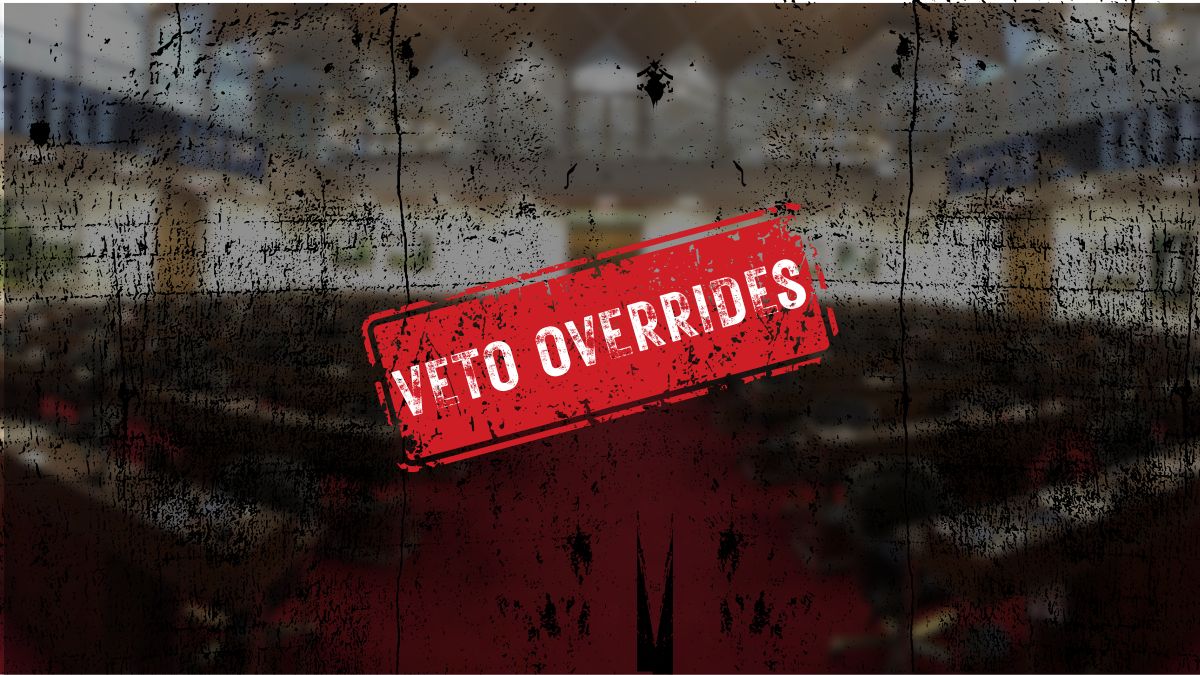After the North Carolina General Assembly rushed through a slew of bills ahead of their summer recess, Democratic Governor Josh Stein vetoed 14 of the bills that were sent to his desk, calling some of them “dangerous” or “mean-spirited”. Here’s a look at the bills Gov. Stein has vetoed so far in his first seven months in office.
Guns
Senate Bill 50 Freedom To Carry NC. Senate Bill 50 would remove the state’s requirement for an individual to obtain a permit in order to carry a concealed loaded firearm in public. The measure is unpopular with the majority of North Carolinians, including gun owners, according to polling by Everytown for Gun Safety and Elon University.
In his veto message, Stein called for protecting the right to bear arms without recklessly endangering law enforcement officers and the citizens of the state. “This bill makes North Carolinians less safe and undermines responsible gun ownership. Therefore, I am vetoing it. The bill eliminates training requirements associated with concealed carry permits and reduces the age to carry a concealed weapon from 21 to 18 years old. Authorizing teenagers to carry a concealed weapon with no training whatsoever is dangerous. The bill would also make the job of a law enforcement officer more difficult and less safe. We can and should protect the right to bear arms without recklessly endangering law enforcement officers and our people.”
House Bill 193: Firearm Law Revisions. House Bill 193 would allow private schools to permit teachers and faculty to carry a concealed weapon on school grounds. Stein vetoed the bill out of safety concerns. “This bill would make our children less safe. Just as we should not allow guns in the General Assembly, we should keep them out of our schools unless they are in the possession of law enforcement. Law enforcement officers receive more than 800 hours of public safety education, including firearms training,” Stein said in a statement.
Immigration
Senate Bill 153: North Carolina Border Protection Act. Co-sponsored by Senate leader Phil Berger (R-Rockingham), this bill would require state law enforcement to cooperate with the U.S. Immigration and Customs Enforcement (ICE), ban immigrants from receiving state benefits, and open up state jurisdictions that don’t cooperate with ICE, considered “sanctuary cities”, to being sued over crimes committed by immigrants.
Stein cited safety reasons for his veto of Senate Bill 153. “Senate Bill 153 would also make us less safe, so I am vetoing this legislation. At a time when our law enforcement is already stretched thin, this bill takes state law enforcement officers away from their existing state duties and forces them to act as federal immigration agents. Furthermore, under current law, people without lawful immigration status already are prevented from receiving Medicaid, SNAP, Section 8, and other benefits,” read his statement on the veto.
House Bill 318: The Criminal Illegal Alien Enforcement Act. This bill, also supported by a notable Republican, House Speaker Destin Hall, aims to require sheriffs to cooperate with ICE detainers and addresses what Republicans consider a loophole that would allow sheriffs to not cooperate with the agency.
For this piece of legislation, Stein pointed to his constitutional obligation as governor for why he vetoed the bill. In his veto statement, Stein said, “My oath of office requires that I uphold the Constitution of the United States. Therefore, I cannot sign this bill because it would require sheriffs to unconstitutionally detain people for up to 48 hours after they would otherwise be released. The Fourth Circuit is clear that local law enforcement officers cannot keep people in custody solely based on a suspected immigration violation.”
DEI and LGBTQ+
Republicans have passed three anti-Diversity Equity and Inclusion (DEI) bills this session, and Stein has vetoed them all. There is Senate Bill 558, Eliminating “DEI” in Public Higher Ed; Senate Bill 227, Eliminating “DEI” In Public Education, and House Bill 171: Equality in State Agencies/Prohibition on DEI. In his veto message for these bills, Stein included House Bill 805: Prevent Sexual Exploitation/Women and Minors, which he also vetoed.
House Bill 805, originally meant to do as the bill title says and protect women and children by making it easier to remove pornographic images of oneself from online, was morphed into a different bill by Senate Republicans. The bill, though still retaining its original text, now additionally requires the state to officially only recognize two sexes and ban state funds from being used on gender affirming care, as well as extend the time for medical malpractice suits for gender affirming care in an attempt to intimidate medical providers.
Stein called out the legislature for bringing up these “culture war” focused bills instead of tackling the issues that actually matter to the people of North Carolina.
“At a time when teachers, law enforcement, and state employees need pay raises and people need shorter lines at the DMV, the legislature failed to pass a budget and, instead, wants to distract us by stoking culture wars that further divide us,” the statement reads.
“These mean-spirited bills would marginalize vulnerable people and also undermine the quality of public services and public education. Therefore, I am vetoing them. I stand ready to work with the legislature when it gets serious about protecting people and addressing North Carolinians’ pressing concerns.”
Separation of Powers
House Bill 402: Limit Rules With Substantial Financial Costs. Originally called the REINS Act, House Bill 402 would require any proposed rule or regulation from state agencies that would have a cost of $20 million within five years to receive approval from the Republican-led legislature. Rules that cost over $10 million or over $1 million would require unanimous approval or two-thirds approval, respectively, from the appropriate board or commission. The power to control regulation usually belongs to the Governor and other members of the Council of State- a council of 10 elected officials, 5 Democrats and 5 Republicans.
In a press release regarding the veto of the bill, Stein argued this would make implementing life-saving regulations harder for the state. “This bill would make it harder for the state to keep people’s drinking water clean from PFAS and other dangerous chemicals, their air free from toxic pollutants, and their health care facilities providing high-quality care,” Stein wrote in the press release. “It would impose red tape, including an unworkable unanimity requirement, that would hamstring the decision-making of agencies, boards, and commissions, making them less effective at protecting people’s health, safety, and welfare.”
House Bill 549: Clarify Powers of State Auditor. This bill would give additional investigative powers to the Republican State Auditor, Dave Boliek. This is yet another piece of legislation that Republican lawmakers have pushed to bolster Boliek since he won his race in 2024.
In Stein’s statement on vetoing House Bill 549, he cites security and privacy risks that may damage the state’s business environment. “House Bill 549 would grant the Auditor sweeping access to the data and records of any private corporation that accepts any amount of state funding. Giving the Auditor this intrusive power may undermine our state’s efforts to recruit businesses to North Carolina,” said Stein. “Additionally, the bill would remove the Office of State Auditor from the state’s cybersecurity efforts led by the Department of Information Technology, putting North Carolinians’ personal identifying information at heightened risk of a breach.”
Additional Bills
Senate Bill 416: Personal Privacy Protection Act prohibits public agencies from releasing information about political donations and donors to certain nonprofit organizations.
Senate Bill 266: The Power Bill Reduction Act would allow Duke Energy to bill its customers for power plants that are in the process of being built, with the possibility of the plants never being finished, meaning no return for customers who were billed for the project. The legislation also rescinds Duke Energy’s carbon-reduction goals that were held to four years ago through a separate law.
Senate Bill 254: Charter School Changes removes the Superintendent of Public Instruction, Democrat Maurice “Mo” Green, and the State Board of Education from charter school oversight and shifts that power to the state’s Charter School Review board, whose members are selected by the Republican-led General Assembly.
House Bill 96: Expedited Removal of Unauthorized Persons was originally a bill about squatters, but it now bans city governments from passing any regulations related to pet stores.
Republicans in the legislature aim to override all 14 of Stein’s vetoes. So far, eight of Stein’s 14 vetoes have been overridden. The legislature successfully overrode:
House Bill 549, House Bill 402, Senate Bill 416, House Bill 193, House Bill 318, Senate Bill 266, House Bill 805, Senate Bill 254. With both chambers successfully overriding Stein’s vetoes, those bills are set to become law over the Governor’s objection. Neither chamber has voted on House Bill 171 or House Bill 96.
Meanwhile, the House has not yet taken up Senate Bill 50, Senate Bill 558, Senate Bill 227 or Senate Bill 153. The pause between vetoes may be because Republicans are waiting to have the number of votes to successfully override the vetoes. Though Republicans are the majority in both chambers, the Senate has a supermajority while the House is one member short of that same power.
After adjourning Tuesday without taking up any additional vetoes, House Speaker Destin Hall said there won’t be any additional votes until August.





